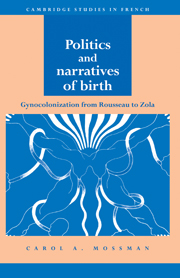Book contents
- Frontmatter
- Contents
- Acknowledgements
- A note on translations
- Introduction: conception of this book
- Cycle 1 Stendhal: delivering a plot
- Cycle 2 Production, reproductions, and narrative form: Adolphe
- Cycle 3 Gynocolonization: Rousseau, Michelet, Zola and the nineteenth-century French novel
- Conclusion
- Notes
- Bibliography
- Index
- CAMBRIDGE STUDIES IN FRENCH
Cycle 3 - Gynocolonization: Rousseau, Michelet, Zola and the nineteenth-century French novel
Published online by Cambridge University Press: 22 September 2009
- Frontmatter
- Contents
- Acknowledgements
- A note on translations
- Introduction: conception of this book
- Cycle 1 Stendhal: delivering a plot
- Cycle 2 Production, reproductions, and narrative form: Adolphe
- Cycle 3 Gynocolonization: Rousseau, Michelet, Zola and the nineteenth-century French novel
- Conclusion
- Notes
- Bibliography
- Index
- CAMBRIDGE STUDIES IN FRENCH
Summary
section i
Introduction: toward a bodied politics
All of us are born into this world, but only half of us possess the power to give birth. The time has come for me to politicize this discussion of reproduction. In the Introduction, I pointed to the stupefying silence which, in art, has surrounded this most primordial of human experiences. True, there is a hagiographic tradition, pastiched by Rabelais and Sterne, which features extraordinary gestation and birth. Mythologizing origins is one way to launch a remarkable life, and it is a strategy that both Chateaubriand and Michelet favor in their own efforts at canonization of the Romantic self.
We shall be in a position to realize that significant social transformation has taken place when women begin to represent their relation to birth, both their bestowal of life as well as their own emergence into the world as subjects of action. In the plastic arts and in literature, the twentieth century has witnessed the commencement of the depiction of origins as self-portrait. However, when in 1854 the papal bull Ineffabilis Deus elevated the Immaculate Conception of the Virgin Mary to the status of dogma, it severed one of occidental culture's most sanctified icons of maternity from the material conditions of her own birth. To do this was merely to institutionalize an evolving relation to the maternal and to reproduction which had been occurring in France as of the Revolution and even before.
- Type
- Chapter
- Information
- Politics and Narratives of BirthGynocolonization from Rousseau to Zola, pp. 139 - 224Publisher: Cambridge University PressPrint publication year: 1993



